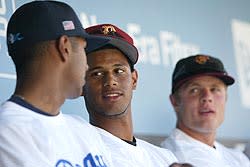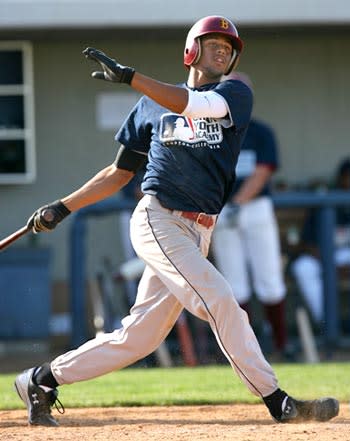Hicks' love of baseball swayed his dad

Aaron Hicks of Long Beach Wilson High School chats with other draft prospects at a workout at Dodger Stadium.
(Larry Goren, special to Y! Sports)
LONG BEACH, Calif. – Aaron Hicks leaned over the kitchen table in his father’s home two nights before the draft, studying the numbers printed out on a sheet before him. These weren't the dollar figures the baseball world will throw his way Thursday when Hicks becomes a first-round pick, nor were they the scouting reports that contain the following: a 97 mph fastball with excellent command, a 4.15-second time running to first base, raw hitting ability from both sides of the plate and astonishing range in center field.
Some teams believe Hicks, 18, can’t miss on the mound, envisioning a power pitcher who could be rushed to the major leagues, perhaps in time for his 21st birthday. Others envision him as an impact position player, a multi-dimensional offensive weapon who must refine “raw” skills, that dirty little word in baseball that indicates he has talent, but will have to work hard to develop it.
Sitting across the table from Hicks was his father, Joe. A few years ago, it would have been hard to imagine Joe sharing with Aaron his own minor league statistics, numbers that told a tale of promise turned to heartache. Joe’s trail led from Walla Walla, Wash., to Reno, Nev., and finally to Amarillo, Tex., where it stopped cold in 1979. Numbers on the upswing suddenly swung backward.
A few years ago, Aaron learned how Joe’s career ended. He found out why his father initially shielded him from playing a sport in which he will likely receive a seven-figure bonus if he turns professional instead of taking a scholarship offer to USC.
Aaron found out why Joe steered him toward golf and basketball, sports Joe believed Aaron could better control his destiny. Aaron found baseball on his own and went behind his dad’s back to play it.
When he did, he helped his father find himself, to make peace with the game that nearly destroyed him. Aaron found a mentor and motivation that couldn't be found anywhere else.
“I figured, by him allowing me to actually play baseball, it is living a little of his dream and passing it on to me,” Aaron said. “And he let me get all the fame and stuff for it.”
Joe Hicks became a baseball player by accident and ceased to be one by accident. He played what he estimates as “six high school games” before the daughter of former Padres scout Marty Keough flagged him down before a track meet to tell him that her father had picked him in the 12th round of the 1975 June draft.
Joe took a $5,000 bonus and went to rookie ball. He wore Dave Winfield’s No. 31, hoping one day that Winfield would leave the Padres as a free agent and he would take over right field. Joe knew he was making up for lost ground, but he also believed he was going to make it to San Diego.
He, too, was considered raw. His manager in Amarillo, Glenn Ezell, spent many nights imploring him to transform his tools into skills.
“I’m gonna tell you about Joe Hicks,” said Ezell, who is in his 42nd year in professional baseball and is currently the Detroit Tigers farm director. “He was an absolute thoroughbred. He was about 6-5, sleek and cut and had wonderful agility. He had a good arm but he didn’t know how to use it yet. He had some problems with the bat, but he was probably going to conquer those. Was he gonna get a big league opportunity? My thought was yes.”
Hicks played in Double-A Amarillo in 1978 and was asked to repeat the level in 1979. He said the Padres told him he would be promoted if he performed well. Hicks hit .281 with 13 home runs in 126 games. The promotion never came.

Aaron Hicks is a fleet center fielder who hits with power and also possesses a 95 mph fastball.
(Larry Goren, special to Y! Sports)
He felt betrayed, fought his anger, and was convinced that he should have never been playing for Amarillo the night in San Antonio when one pitch changed him.
“I came up to the plate at twilight when it was always hard to pick up the ball,” Joe said. “I completely lost the pitch. The next thing I know, bam, it hit me right in the (orbital) bone. It was completely solid. It didn’t hit helmet or anything.”
Two years later, the shaky left eye chased Joe Hicks out of baseball. He didn’t care if he ever touched the game again. What he didn’t know was how his son would bring him back.
As a toddler, Aaron found Joe’s last 34½ Louisville Slugger, choked up on it, and splintered it by hitting it against a tree. “I used it as firewood and burned it up,” Joe said.
Aaron played golf because his father didn’t want him to play baseball. When Joe’s friends mentioned baseball, Joe offered a curt look and “killed the subject.”
But Aaron was a thoroughbred’s son. “When I told him I didn’t want to play golf anymore, it broke his heart,” Aaron said. “Once I started, I knew I wanted to be a baseball player.”
Aaron started playing behind his dad's back. Joe was driving home from work one day and noticed a 12-year-old boy hitting balls where no 12-year-old should be hitting them.
“The little knucklehead found baseball himself,” Joe said.
Aaron vaguely knew that his father had been a minor league outfielder. He later discovered his father’s Padres jacket. He hit right-handed like his father did, but Joe couldn’t watch. He told Aaron to become a switch-hitter.
It was then that Aaron understood why Joe had never wanted him to play.
“He wanted me hitting from the left side because not many (left-handed batters) get hit by pitches,” Aaron said. “I could hit anything right-handed, but I (struggled) left-handed. I figured that was his way of telling me why he didn’t want me to play baseball at first, but that he wanted to help me now.”
The past gained clarity. So did the future.
Joe found peace and became Aaron’s mentor. He shared stories from his career, the good times with Ezell and the bad times when prejudice flared at a black kid from California playing in the Texas League.
Joe worked with Aaron in center field and taught him how to position himself and read batters. They worked on hitting. Aaron always pitched, but never saw himself as anything but an everyday player. In a draft where several first-round picks could be pitchers or hitters, Hicks has no doubt what he is.
“I don’t like sitting around for my start,” he said. “I like competing every day, not once every five days. I like showing what I can do.”
Aaron’s love for the game and desire to play everyday, Joe admits, is what saved him. When he opened his emotions to his son, he was able to turn away from the past.
“I hated baseball,” Joe said. “I always told myself the only way I wouldn’t make it was if I got injured.”
Joe, 52, said that anger is gone now, his rage replaced by Aaron’s passion. The only sign that he was once hit in the eye is reading glasses. And he likes what he sees on Aaron's scouting report.
Ezell was in Detroit’s draft preparation room Wednesday. He looked at the board and saw Aaron Hicks, from Long Beach Wilson High School. He called Detroit’s area scout in Southern California and learned that Joe had been a fine father and helped his son follow baseball. He said he was pleased to learn that the thoroughbred had found his way again.
“Aaron and I used to watch the Kentucky Derby,” Joe said. “I would say, ‘Aaron, if you were a race horse, you would be running that race. You wouldn’t be running for $5,000. If Aaron was a horse and he went up for bid, he would be that horse bid for six or seven million."
Aaron will learn Thursday where his stable will be, confident that he will finish the race his father began.
“That’s really important for me,” Aaron said. “He got taken out of the game. I’m carrying on what he did and trying to go as far as I can so that I can show what the Hicks family can do.”
